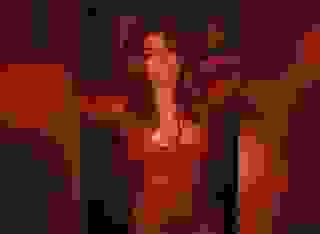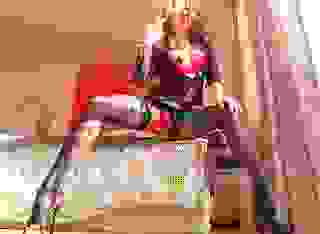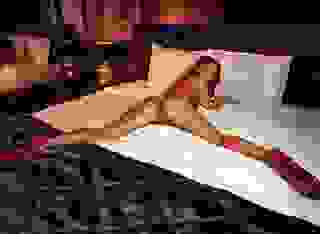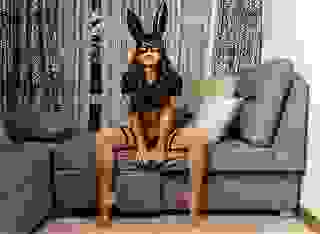Note: You can change font size, font face, and turn on dark mode by clicking the "A" icon tab in the Story Info Box.
You can temporarily switch back to a Classic Literotica® experience during our ongoing public Beta testing. Please consider leaving feedback on issues you experience or suggest improvements.
Click hereMariah snorted, "How convenient, Mr. Kincaid. It seems you have your justifications all thought out. Carefully constructed excuses to do nothing."
Michael set his brandy down on the table a bit too hard. He was starting to lose his temper. Mariah jumped up when his glass banged, and stood cross-armed, watching him. Michael sighed. He'd probably just lost any trust he'd managed to build. "Why are you so hostile toward me? I've never done anything to you."
"Except for spying on me for years," she reminded him. She turned abruptly and walked to the window. She was furious, and she was having trouble sorting out why. She was upset about the invasion of her privacy, but she hadn't even begun to sort through her feelings about that. She knew it wasn't the reason for her hostility. She was angry about his failure to do a thing to help anyone, but he seemed to be preparing to help now, so that couldn't be the reason, either.
If Michael hadn't sent his men to help her, Hawley and his lackeys probably would have beaten her to a pulp. She was grateful to the guards who saved her, but she just couldn't seem to summon the appropriate gratitude toward Michael for his role in it. Everything about him rubbed Mariah the wrong way.
Even his looks irritated her. His dark hair had a slight wave to it, and it was just a trifle overdue for a trim. His complexion hinted at Mediterranean heritage, and his coffee-colored eyes beneath dark brows were moody enough for the cover of a trashy romance novel. His mouth was a study in masculine sensuality above a firmly set jaw. He would have been too pretty for Mariah's taste except for a harsh, unrefined quality to his cheek bones and the subtle asymmetry of the bridge of his nose. The fact that Michael was so attractive only made her angrier. It was one more source of unearned privilege.
And there, she realized, was her answer. He was the product of unearned, undeserved privilege. That's why she felt so hostile toward him. People like his family were why the people living outside these walls were suffering. Just over a decade had passed since society crashed and burned. The privileged wealthy broke the world with their insatiable greed and hunger for more power and privilege.
"The Fall," as the collapse of government and social institutions came to be called, happened at breakneck speed, but it had been a long time coming. The seeds of corruption were sown long before the bitter harvest. On January 21, 2010, the United States Supreme Court decided that corporations had the right to free speech, and that free speech included the ability to funnel unlimited funds into the country's political machines. Corporate influence grew until meaningful democratic representation was completely choked out. At noon on January 20, 2023, the term of the last democratically elected U.S. president expired without an elected successor.
Similar scenarios played out in democracies around the world. The world's wealthy and powerful were united by a common goal: amassing more wealth and more power. To do so, they used corporations as the vehicles to take full possession of the levers of governmental power. Years of power brokering and kingmaking yielded slates of unapologetically corrupt candidates beholden to the ultra-wealthy and the corporations through which they acted.
They bled the world dry.
The new corporate kings enforced relentlessly exploitive environmental policies. Like arsonists setting their own houses on fire, they stripped environmental regulations and actively discouraged renewable energy in favor of fossil fuels. The scattered voices of environmental reason among the wealthy couldn't stand against the onslaught of unbridled and self-destructive short-term gain.
Climate change dramatically outpaced the models for worst-case scenarios. Global famine, disease, and wars for habitable land fulfilled the direst projections. Overwhelming numbers of climate refugees inundated the areas that remained habitable, resulting in widespread violence as established residents and newcomers competed for resources.
Like the proverbial frog that boils alive if the water is heated so slowly that the frog doesn't notice, the world's citizens waited too long to act. By the time they were boiling, they were already powerless to effect peaceful change. Every revolution is proceeded by a tipping point -- the straw that breaks the camel's back. Throughout history, those tipping points were reached in different countries at different times. For the first time, the entire world reached a collective tipping point, and the fabric of civil society unraveled across the globe.
It started in Europe. Italy's government collapsed after a Russian-backed rebellion roiled the country. Other European democracies began to fall like dominos as civil war and armed rebellions raged through the continent. The rest of the world wasn't far behind. The United States, Canada, Germany, Finland, Sweden, and Australia held out until a series of pandemics decimated Europe and Asia and spread quickly to the rest of the world. The beleaguered democracies declared emergencies, but their corruption-riddled governments were too incompetent to take effective measures. Emergency declarations were used primarily to impose authoritarian measures to quell dissent against governmental ineptitude and to clamp down on revolt. Elections were suspended, and dictatorships were solidified.
Democracies were not the only casualties. Early during the crisis, Russia's GRU viewed the disasters as an opportunity to upset the balance of power and seize territory and natural resources. Russia's already stressed economy was hijacked to fund civil wars and industrial "accidents" in neighboring countries. Meanwhile, millions of Russians died at the hands of their own government's policy of quelling insurgency at any cost.
China was also suspected in contributing to the collapse of democratic governments through market manipulation and general economic skullduggery. Like the Russian government, China responded viciously to its citizens' dissent. Thirty-eight years after the Tiananmen Square Massacre, the rulers of China's Communist Party finally met their fate at the hands of the citizens they oppressed.
During the later stages of The Fall, nations began "going dark" and dropping off the grid as their power sources and communication infrastructure were destroyed or disrupted. The internet faded one server at a time as electrical grids went down. Hostile countries hacked and destroyed each other's communication satellites.
Even personally delivered messages became untenable due to the dangerousness of travel and the territorial restrictions in place to prevent the spread of disease after the pandemics struck. The United States lost contact with the rest of the world. It took two years to develop a courier system that could relay messages across the country without spreading contagion. By that time, there was no central command structure to make use of the system. In the absence of functioning government, states and counties were reduced to lines on a map. Everyone had to fend for themselves.
Amidst the suffering and privation they set in motion, the wealthy barricaded themselves in luxury. When everything started circling the drain, they fled to bunkers and compounds and filled them with enough supplies for several lifetimes. Like this compound. Like Michael's family. Mariah realized Michael wasn't old enough to have contributed to The Fall, but he was the beneficiary of the extravagant wealth his father amassed through the economic and social injustices that led to it.
That had to be the reason she felt so much hostility toward Michael. She was blaming him for the actions of his father and his father's cohorts. She hadn't really been giving him a chance. Identifying the source of her anger was a start, but it didn't rid her of it. She would have to make a conscious effort to be fair to him despite her resentment. It would be easier if he stopped making excuses for doing nothing in the face of dire need.
She turned back to Michael and took a deep breath. "If it's not feasible to let people come and go from the compound, why can't you bring in as many as this estate can support? It's huge. If the land was converted for crops, it could surely support a large number of people."
Michael nodded, encouraged that she was engaging with him despite her anger. He suspected that she had no idea that her feelings were written all over her face. He could see that she was still furious as easily as he could see that she was trying not to show it. "Based on my research, I think we could support one hundred people. It might be more, but we'd need to start with a hundred."
She gaped at him. "You mean you know it would work, but you haven't done it? Why? Why even do the research if you're not using it?" Her cheeks were coloring again as her anger rose.
"There are two reasons I haven't done it. The first is that I had no ability to do it until very recently. My father died about two months ago. While he was alive, he adamantly insisted on complete isolation. He had the access codes, the keys, and the security force to enforce his directives. Nobody was allowed through that gate." Mariah looked unconvinced, and Michael had to admit that when he said it out loud, it seemed pretty thin.
"For God's sake, Michael. You were an adult. Are you saying you were powerless?"
Michael struggled to find an explanation. "I wasn't powerless. My options were limited, but I acknowledge that I didn't try very hard to explore them. I don't know how to explain it in a way that would make sense to you. This was always a very authoritarian household and my father punished disobedience severely. Perhaps I was conveniently blind to chances I could have taken."
Mariah appeared to be somewhat mollified by his acknowledgment of fault, but he knew that what he had to say next would upset her again.
"Whatever mistakes I made in failing to oppose my father in the past, he is no longer an obstacle," Michael began.
"Then why?"
Michael held up his hand in a gesture for silence. "That brings me to the second reason I haven't brought anyone in." He stood and walked over to the window where she was standing. "Let's suppose I tell you that we can let one hundred people in tomorrow." A smile lit up her face. It was so infectious that he felt a smile forming on his own face, until he realized how cruel his next words would be.
"Which people, Mariah? Which one hundred people would you save?" Her face fell, but he persisted. "Would you save your friends first? I know you don't have family around here, but what about those closest to you? Would they get the spots inside the compound?"
"Of course not!" she responded angrily. "What kind of person do you think I am?"
Michael pressed on. "Then how would you do it? If you choose the people with the greatest need, you'll bring in the people least able to grow crops and support themselves. The elderly and the disabled need help the most, but can contribute the least in terms of labor. Families with many small children are also in great need, but they would bring many mouths to feed and only one or two adults who could work to support them. It just won't work that way. So how would you do it? Which one hundred people?"
Mariah was momentarily at a loss. "You can't give up just because it's difficult. You have to find a way."
"I agree. So, what is that way? How do you pick the one hundred people?"
After some consideration, she responded, "I think the fairest way would be to match the people who were allowed in with the work that needs to be done. Hopefully, they could help support people outside the walls. You would need to bring in enough people who could farm, build and repair things. Without the right equipment, it would take a lot of people to dig fields and grow and harvest crops." She glared at Michael. "But I suppose you're going to tell me why that won't work."
Michael pinched the bridge of his nose between his fingers and sighed. "Let's assume you find a fair way to choose people with the right skills to come in. What about their families? A metal worker is important, but Ashland's only metal worker has six small children. The one hundred-person quota will fill up fast with nonproductive people unless you're willing to separate families. If you bring in the metal worker and leave his family outside, what will happen to them?"
"And what about the other people left outside the compound? They'll be furious when they can't come in. On top of that, we would deprive the town of labor and skills it needs. What do you do about a doctor? If we have one hundred people living in here, we'll need a doctor, and there's only one in town. I will not permit people coming and going from the compound -- not even the doctor. Either we have no doctor in the compound, or the town loses its doctor."
"It's easy to villainize me for not bringing people into the compound, but it's different if you put yourself in my position and face the realities of all that would entail, isn't it? It's hard to be self-righteous when you're the one deciding who gets saved and who is left outside to suffer."
"Think about it, Mariah. Which families are you willing to tear apart? Do the people inside the wall die without a doctor, or is it the people outside who must die unattended? How do you tell the infirm and elderly that they aren't useful enough to come in? What do you say to the children whose parents come in without them?" Michael knew he was being unnecessarily cruel, but he was determined to drive his point home, to make her stop blaming him.
Mariah turned away and looked out the window. Her eyes stung with tears she refused to shed. It had been foolish to think Michael would help. All he was interested in was justifying his own inaction. He was just tormenting her, teasing her with the possibility of helping people in desperate need and then taunting her when she grasped at the hope he held out. She wanted to leave, but she couldn't. She couldn't leave until he unequivocally extinguished the last flicker of hope.
Michael silently cursed himself. The last thing he'd wanted was to hurt her. The pained look in Mariah's eyes before she turned away cut him to the quick. She touched the window, as if she needed to brace herself, or perhaps to reassure herself of the reality beyond the glass. She didn't make a sound, but he was afraid she might be crying. She was looking away from him and he couldn't see her face.
"Mariah..." He put his hands on her shoulders, and it startled her. "I'm sorry, Mariah. I don't want to upset you."
"Don't you?" she asked softly. She heard him sigh. Reluctantly, she allowed Michael to turn her to face him.
He tilted her chin up until she was looking him in the eye. "No. I never want to hurt you. I was angry and defensive. Things came out the wrong way."
She looked away. He might regret it now, but she knew he had wanted to hurt her when he said it. "What do you want from me?"
The question caught him off guard, and his heart jumped into his throat. The answer was "everything," but he caught himself before he said it. There was much more he needed to tell her before he made his move.
"Please, Mariah. Come sit down." She seemed disinclined, but allowed him to take her hand and lead her back to the chair. He picked up the house phone again and asked Marcus to bring two more drinks. He winked at Mariah. "I won't tell if you don't."
Michael waited until Marcus brought their drinks to begin. "I've been planning to meet you. I hadn't figured out how to arrange that, but today, Brad Hawley forced my hand. As far as I know, it's the only useful thing the man's done in his life. I want to work with you. I'm serious about doing something to help, and I know you can help me do it. Everything I said about the obstacles we face is absolutely true, but I've been thinking about this for a long time and I have some ideas."
"As I told you earlier, I've watched you for years. Now that I'm saying it out loud, I realize how creepy that sounds. I didn't mean to stalk you. I was still in college when my father called me home and locked down the compound. I was isolated, anxious about what was going on outside, and lonely. I watched everyone in town, just like a person might people-watch at a street cafe. Soon, I found myself looking for you in the camera feeds."
Mariah conceded to herself that Michael's explanation did put his spying in a better light. That didn't mean she wasn't still angry about it, though, and it definitely didn't mean she was going to let him off the hook for it. He was disarming, which was reason enough to remain guarded. He was likeable, but she didn't want to like him. She did, however, want to hear more about what he was planning and how she fit into it.
"I know you're angry because you think I did nothing to help anyone while my father was alive. I'll make a proposal today after we talk more about my plans, and if you accept it, you'll be helping me with the project. Before you decide whether you want to work with me, I want you to understand me a little better. I'd like to correct your impression of me, but to do that, I need to tell you something that you must keep secret. If you want to hear it, I need your solemn promise."
Mariah considered. "I would like to hear it, but I take my promises very seriously. I need to know more about what I'm promising."
Michael laughed. "It's nothing nefarious. Well, my father would have found it nefarious, but you wouldn't. Nobody was harmed."
Mariah nodded. "Okay, I promise."
"I told you nobody went out through the gate, and that was true. I'd rather not go into the details, but I found a way to get supplies to Lois Hubbard for her to sell in her store. Nobody in Ashland has seen what the inventory is like in other towns, so nobody realizes how well stocked Lois' store is comparison. I know she charged people for the supplies I gave her, but it would have raised questions if she didn't. We agreed on the price she would charge so I could be sure it stayed as low as possible without being suspicious. Her profits compensated her for the risk she was taking. There was no telling how far my father might have taken things if he found out what we were doing."
The expression on Mariah's face softened as she listened to his story. "I wouldn't have taken you for a smuggler, Michael Kincaid. I like it." She smiled at him, and his chest constricted. For the first time today, she looked relaxed. He loved seeing her like this.
A polite cough at the door caught his attention. It was Marcus, announcing lunch. Michael turned back to Mariah. "Please, join me for lunch and we can talk about my project." He took a chance and joked, "I'm afraid we don't have any caviar, but I'm sure Marcus could arrange finger sandwiches."
She cringed. "I think I could forego the finger sandwiches."
"I think you'll like Marcus's pasta much better."
The dining room was huge, but Marcus had created a more intimate setting by placing a large floral arrangement to partition off one end of the enormous table. Despite the formal architecture, the cream walls and white molding made the room feel surprisingly light. Whoever designed the room had avoided the heaviness of a single, large chandelier by placing three small chandeliers above the ends and middle of the long table. Mariah admired the flowers on the table. "They're gorgeous."
"Marcus never puts flowers on the table for me," Michael pretended to pout, earning a fleeting smile from Mariah. At least she was trying to give him a chance.
Lunch was pleasant. The salad was delicious, and Mariah savored the lemon and herb linguini. A dish of sliced grilled chicken accompanied the linguine. Michael added the chicken to his pasta after Mariah declined his offer to serve it to her. "You know I don't eat meat, don't you? That's why the chicken wasn't in the pasta."








